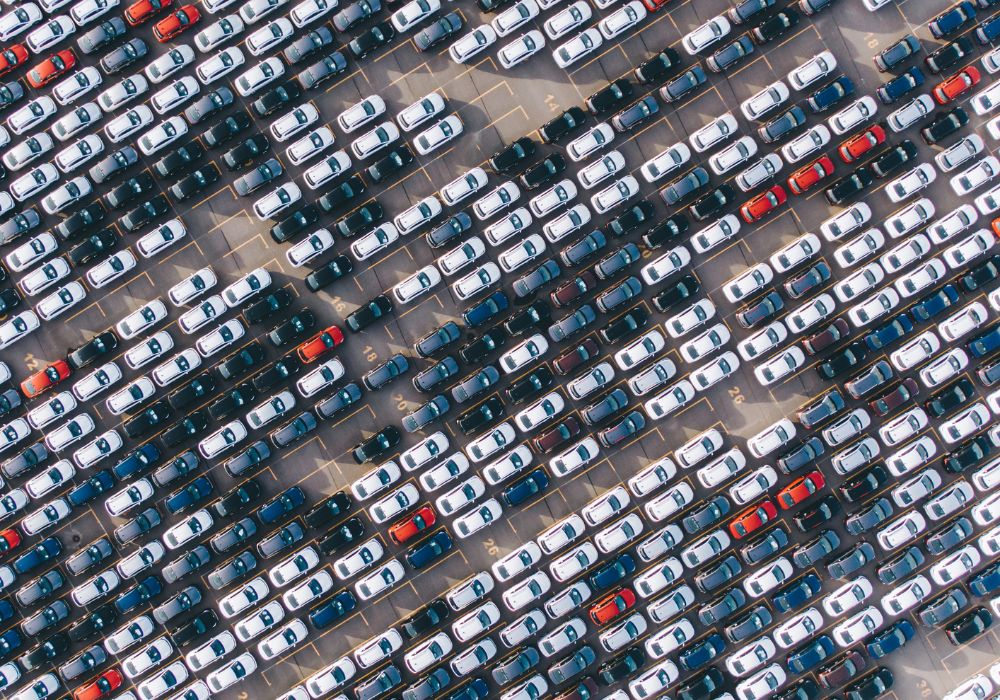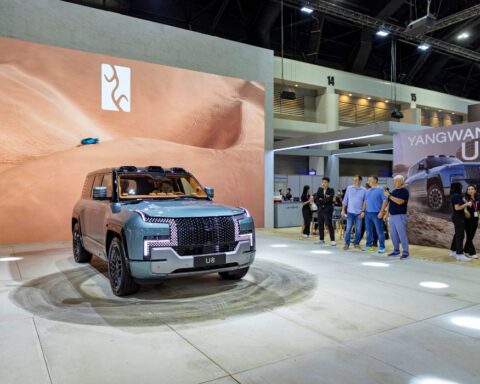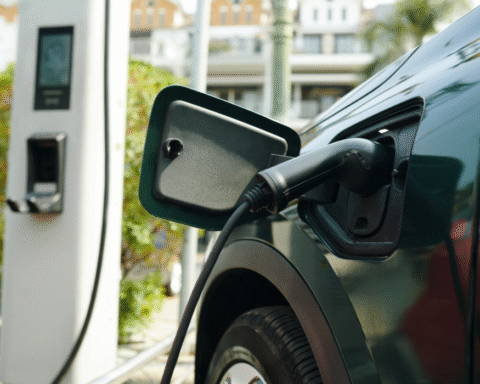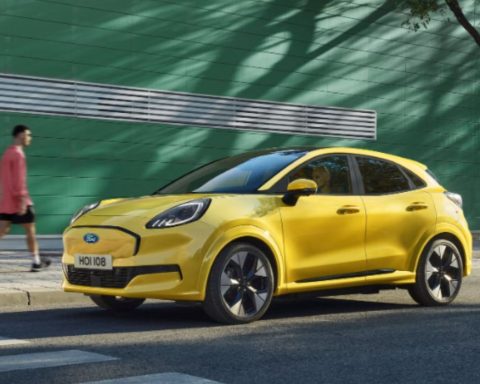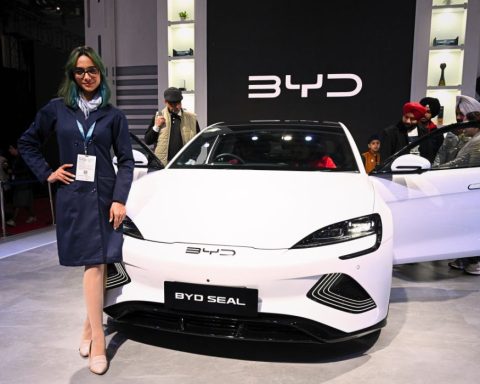Ford and Mercedes-Benz lead the automotive world in working to clean up their supply chains, according to a new report with rankings endorsed by a labor and environmental civil society coalition. But the car industry is far from achieving a “truly clean car” and progress is “lackluster,” the scorecard notes.
Car companies are increasingly embracing electric vehicles as a new market opportunity exposed by worsening climate and biodiversity crises. But, while electric vehicles have no tailpipe emissions, there are a lot more factors involved in producing a car: steel, tires, batteries and people affected along the supply chain. The mining and manufacturing of these metal-dense machines puts heavy burdens on landscapes, Indigenous peoples and workers. It’s not enough for a car to be EV to be considered truly “clean,” the report says.
The Lead the Charge coalition assembled 80 measures of what a clean car supply chain would look like, ranking the top 18 automakers against it. The indicators include policies and actions to promote using recycled materials, sustainable mining practices, unions and efforts to reduce emissions. The intention, the coalition says, is to encourage competition among firms pushing their suppliers to achieve responsible practices.
The ranking is in its second year, but car companies still have large blind spots, the authors say, especially related to the rights of Indigenous peoples to free, prior and informed consent (FPIC) on mining projects.
“What the scorecard shows me is that the automotive industry is really not ready to participate in the supply chain in a responsible way, and in particular, with respect to understanding, preventing and mitigating any impacts on Indigenous peoples,” says Kate Finn, executive director of First Peoples Worldwide, an Indigenous-led research and advocacy group at the University of Colorado Boulder and member of the coalition.
Around the world, more than half of identified deposits of minerals in high demand by electric vehicles and other climate technologies are on or near Indigenous and peasant lands.
The report defines a “clean car” as having (1) a fossil-free supply chain that also has the lowest possible negative impact on human health, biodiversity, resource depletion and ecosystem resilience; and (2) a supply chain throughout which the rights of Indigenous peoples, workers and local communities are respected.
U.S. automakers scored slightly better on average than their European rivals, and East Asian firms fell behind as they lacked policies to address decarbonization in the production of steel and aluminum. The average score was 19%, and no company scored above 50%.
It’s not enough for a car to be EV to be considered truly “clean.”
– Lead the Charge coalition
After Ford and Mercedes-Benz, Tesla appeared in the third slot, up from last year’s ninth spot, the largest jump of any firm. One reason was that it became the first to disclose specific emissions from its use of steel, a ubiquitous material that emits significant greenhouse gases during smelting.
The coalition named Toyota and Honda “climate laggards,” due to continued failure to disclose actions to reduce emissions and a history of lobbying against climate action. The rapidly expanding Chinese firms BYD, SAIC and GAC also ranked low, as they published little information about their supply chain and had few disclosures in general.
The authors note that Chinese firm Geely, however, stood out for its improvement over just a year in setting human rights policies for its supply chain.
Of the car companies mentioned — GM, Ford, Toyota, Tesla, Mercedes-Benz, BYD, SAIC, GAC, Honda and Geely — only Mercedes-Benz responded to Mongabay’s request to comment.
Its statement reads: “We consider ‘Lead the Charge’ to be a meaningful benchmark. The research and results are well-founded and published transparently. In addition, the benchmark interacts directly with the evaluated companies. We also welcome the objective of interaction with the organizations behind Lead the Charge. Overall, we are pleased with the result, which at the same time gives us an incentive to continue our intensive efforts.”
Steel, body and batteries
In addition to human rights issues, the scorecard has a focus on some of the most dominant materials in an electric car: steel, aluminum and the lithium-ion battery, which often includes lithium, nickel and cobalt. The steel and aluminum industries together emit roughly 10% of all greenhouse gases, and in an electric car, the materials account for more than half the weight, according to a report by consulting firm Kearney. The car industry consumes the third-highest amount of steel of any industry, and it is the top user of aluminum and batteries.
The battery makes up roughly another quarter of the car’s weight. Some companies in the ranking received higher scores because they sell batteries without nickel and cobalt, an emerging trend as they adopt lithium iron phosphate (LFP) batteries, which are believed to have lower supply chain risks.
The emissions of steel and aluminum have received less public scrutiny than battery materials, and car companies have made scant progress on pushing suppliers to reform climate-warming practices. A third of the companies have yet to take any action on decarbonizing their aluminum and steel supply. “Green” steel and aluminum make use of energy and processes that shrink emissions.
“Automakers have a big role to play to realize a transformed steel and aluminum industry, as they are major buyers and have a strong pull on global purchasing power,” says Annie Sartor, aluminum campaign director at Industrious Labs, a member of the coalition.
Chris Alford, senior strategist for auto supply chains at climate justice network the Sunrise Project and who helped design the methodology, says only official company disclosures were used to evaluate a firm’s actions. Firms are held accountable for official disclosures more strongly than marketing material or other actions.
“The way that we structured the leaderboard was actually to give more weighting to the indicators where companies have to provide evidence of concrete implementation of commitments and policies, as opposed to the ones that are really just, ‘Have you got a policy? Or have you made a commitment?’ or ‘Have you set a target?’” Alford said.
Handling critical minerals
The leaderboard highlights a few case studies within automotive supply chains that the authors say are worth addressing.
In Indonesia, which produces almost half of the world’s nickel, the production of this metal used in many lithium-ion battery types and in steel has been tied to deforestation, rising greenhouse gas emissions, mishandling of toxic waste and violations of the rights of Indigenous peoples. An analysis by Mighty Earth of satellite data found that Indonesia’s 329 nickel mining concessions have driven up to 378,970 hectares (more than 936,400 acres) of deforestation since 2000.
Ford has bought a direct stake in a developing nickel project in Indonesia, saying that it aims to produce a sustainable supply.
Mining firms and regulators, the authors say, have posed significant threats to Indigenous peoples who depend on these forests. In North Maluku, an uncontacted tribe had its customary territory granted to mining companies by government officials.
Indonesia’s nickel production also suffers from its reliance on electricity produced by coal-fired plants that are off-grid and within industrial zones, which has undermined its climate plans.
Indonesia’s nickel production relies on a smelting technology that produces three times as much waste as other nickel smelting facilities. Nickel firms have said they will process and store the waste on land, although experts have expressed doubt that it can be safely maintained, as rainfall and earthquakes could trigger leaks. Nearby in Papua New Guinea, a study found that toxic waste piped into the ocean is making its way into fish, terrestrial plants and even local residents.
U.S.-based GM is one of the few companies that have an explicit requirement for its suppliers to respect FPIC. However, the report notes, GM has invested directly in and seeks to supply from Lithium Americas and its project at Thacker Pass in Nevada, a site considered sacred to several tribes.
Lithium Americas has fielded multiple lawsuits filed by Indigenous groups that claim the infringement of religious rights, lack of consultation and potential groundwater contamination. In November, a judge ruled against three tribes that argued in a lawsuit that consultation needed to finish before operations began.
Solving the gap
Ian Lange, an economics professor at the Colorado School of Mines and adviser to former U.S. President Trump’s White House, expresses some doubt that there are short-term solutions to cleaning up supply chains for cars. Companies don’t have many options for selecting mined materials, he says, and suppliers have historically been unable to demonstrate the true origin of the materials they receive, sometimes taking liberties in providing false certificates of origin.
“It’s hard to keep track of all that,” Lange says.
In the long run, there are likely two solutions that the industry will devise, Lange says. A robust recycling market, which responsibly handles its waste and emissions, may be able to contain pollution and manage human rights concerns better. Also, mining companies may seek out jurisdictions, like the United States, where consumers may assume ethical sourcing.
The Thacker Pass project in Nevada is an early test of this idea. Considering the land and religious rights issues at Thacker Pass, Lange says, “no deposit is as pure as driven snow.”
Finn thinks producing minerals within the U.S. without ensuring FPIC is not likely to improve the social and environmental impacts that mining has on nearby communities. U.S. law does not achieve the FPIC standards outlined in the U.N. Declaration on the Rights of Indigenous Peoples, she says.
“This is our work at First Peoples [Worldwide]: to build the business case for free, prior and informed consent, and that companies have a responsibility to go above and beyond domestic regimes in terms of their responsibility to respect Indigenous peoples, they have the responsibility to do so all the way up to the level of the U.N. declaration,” Finn says.
This article was first published by Mongabay. Read the original story here.


